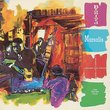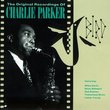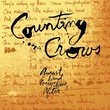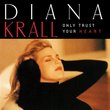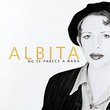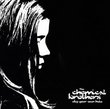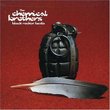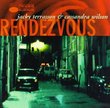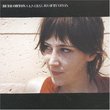| All Artists: Robert Schumann, Beaux Arts Trio, Menahem Pressler Title: Schumann: Complete Piano Trios Members Wishing: 1 Total Copies: 0 Label: Philips Release Date: 11/11/1997 Genre: Classical Style: Chamber Music Number of Discs: 2 SwapaCD Credits: 2 UPC: 028945632322 |
Search - Robert Schumann, Beaux Arts Trio, Menahem Pressler :: Schumann: Complete Piano Trios
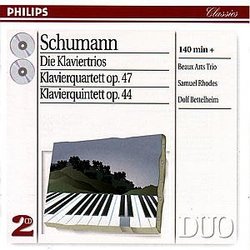 | Robert Schumann, Beaux Arts Trio, Menahem Pressler Schumann: Complete Piano Trios Genre: Classical
This two-CD set, offering Schumann's groundbreaking Piano Quintet, the Piano Quartet, and the three piano trios, is an exceptional bargain. The approach of the Beaux Arts players and their associates is essentially reflect... more » |
Larger Image |
CD DetailsSynopsis
Amazon.com This two-CD set, offering Schumann's groundbreaking Piano Quintet, the Piano Quartet, and the three piano trios, is an exceptional bargain. The approach of the Beaux Arts players and their associates is essentially reflective: they let the music speak for itself and avoid the rhetorical excesses other interpreters often fall victim to. In their hands the quintet, one of Schumann's most inspired creations, receives an especially polished and poised performance, with a lovely dovetailing of voices. The analog recordings are warm and detailed, and they have been optimally transferred to CD. --Ted Libbey Similarly Requested CDs
|
CD ReviewsExcellent performances, superb value 04/07/2002 (5 out of 5 stars) "This collection of Schumann's piano trios, Op. 47 piano quartet, and Op. 44 piano quintet is excellent, epsecially since it's offered at Philips' Duo (2-for-1 price). Having recently performed the piano quartet and quintet, I can say that the Beaux Arts Trio brings much finesse, refinement, and superb musical judgment to these performances. The famous Quintet gets an oustanding performance, not as volatile as the live EMI recording led by Martha Argerich, but then without that recording's self-indulgence either. I think the piano quartet is underrated; it has a absolutely beautiful slow movement and an exhilarating last movement filled with counterpoint. The Beaux Arts gives it an excellent performance, though the slow movement seems rather too ponderous and lacking the radiance it should have. The piano trios aren't as well known: they come from later in Schumann's career and are often considered inferior to the earlier works. I cannot agree, especially in the case of the first two trios, which cotrast beautifully, the first one passionate and tragic, the second one lighter and fresher, almost Schubertian, both with beautiful slow movements. The snag is that the first trio is split between the two discs, which is an inconvenience. Very good sound, too. By the way, if you enjoy the trios, you should also check out the Florestan Trio's two outstanding discs on Hyperion (one with the first two trios, the other with the Piano Quartet, the third trio, and the Op. 88 Fantasiestücke for piano trio). The Florestan's performances are perhaps more imaginative than the Beaux Arts', and they are even better recorded." Not just for chamber musik freaks! This is Schumann's best. 10/09/1999 (5 out of 5 stars) "This 2 CD set offers an extraoardinary bargain. Five works by the underrated German master are heard in incisive performances that only occaisionally succumb to the usual pitfall of many Schumann performances: Zu Viel Schmaltz. When Robert indulged in self-pity, he bathed in it! (especially when he was "Eusebius").... The sound overall is consistent and adequate, although some selections are remastered from analog. Many people have said, "Why couldn't Schumann write a truly great symphony?" He did---the Eb Quintett, op. 44. If you love romantic period chambermusic, you should not miss this collection. This is more than two hours of great music..." Holy smoke. fluffy, the human being. | forest lake, mn | 04/16/2007 (5 out of 5 stars) "now i'm just a big dummy. i really am. but somehow classical music got through my thick skull and into my heart. so glad that it did. these recordings from 1975 by the beaux arts trio are spectacular works of chamber music. mr schumann's compositions are given a vibrantly intense and dramatic going over by these great musicians. soul-stirring stuff in every way. this is the sound of a musical springtime, all green invention and sunshine for the spirit. the violin, cello, and piano tunnel through the music, unearthing and displaying its potential and grace. i listened to the entire two hours and twenty minutes of glorious music that's on these discs this morning, and it was a great experience indeed. i highly highly recommend this set to any and all music lovers. this whole affair is a masterpiece of grand compositions in the hands of brilliant performers."
|

 Track Listings (10) - Disc #1
Track Listings (10) - Disc #1
